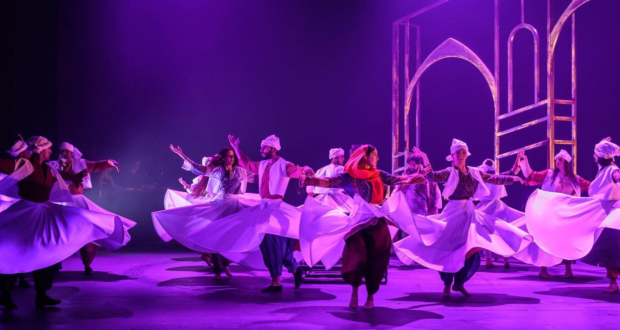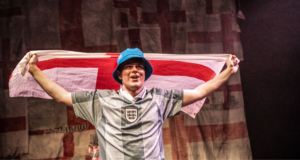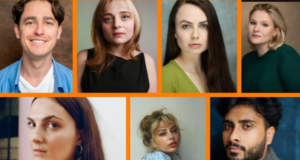An enjoyable evening of musical theatre with a fusion of contemporary and traditional Middle Eastern styles and an interesting subject matter.Summary
Rating
Good
So, I am guessing that people will probably fall into one of two camps in their knowledge of the subject of this show, i.e. those who know and love the works of Rumi and those who know nothing about him. For the benefit of the second group, and with apologies to the first, here’s some brief background information: Jalal ad-Din Muhammad Rumi was a Persian scholar, philosopher, musician and poet born in 1207. His works, teaching love and tolerance, are influential and popular worldwide. A transformative moment of his life was in 1244 when he met wandering mystic Shams of Tabriz. Shams Tabriz disappeared after three years, and Rumi wrote most of his poetry following this disappearance. It is that period in 1244 which is covered by this semi-staged concert/musical, based on a story by Evan Sharma, and with music and lyrics by Dana Al Fardan and Nadim Naaman.
We are introduced to the mystic Shams (Ramin Karimloo), Rumi (Naaman), his family, and some other members of the community. Shams reveals he is searching for an equal and soulmate, and would be willing to sacrifice everything for this. At Shams’ initial meeting with Rumi it seems he may well have found him, although this does not go down well with some. The story demonstrates the increasing influence that Shams has, along with the effect and consequences of that influence, not only upon Rumi, but also the various members of Rumi’s family and the population of the town. It suggests one possible explanation for Shams’ eventual disappearance.
The eighteen strong cast are obviously all very talented, but for me the outstanding performance of the night goes to Karimloo whose powerful voice soars in every number he performs. Naaman and Al Fardan’s music uses lyrics derived from Rumi’s poetry but in contemporary musical theatre style that is heavily influenced by Middle Eastern music, resulting in interesting rhythms and harmonies. A shout out must go to the excellent orchestra at the back of the stage behind a curtain, unseen but certainly not unheard. I particularly enjoyed the joyful ensemble pieces Behold the Golden Sun and Rumi’s Letter sung by Rumi, Shams and Sultan Valed (Yazdan Qafouri).
Gregor Donnelly’s deceptively simple costumes complement Anjali Mehra’s beautifully flowing choreography. The minimal set, comprising arches, benches, boxes and other simple items, are constantly moved about the large stage, probably in an attempt to give the appearance of a busy town. There seemed to be a lot of cleaning of benches going on, which I did find amusing. An enhanced Covid cleaning regime maybe?
Not knowing anything about Rumi or his life (yes, second group) I cannot comment on the accuracy or otherwise of the events portrayed. It was an interesting storyline, the second half more enjoyable than the first, it being a bit more lively. Post-show, I am still unsure about the exact nature of Shams and Rumi’s relationship, although this may be a deliberate intention of course. The two main characters are portrayed as being extremely self-centred and sanctimonious, Rumi in particular, having no regard to the effects of their actions on others. Again, this may be deliberate, to contrast with Rumi’s later writings.
Despite the first half being a little bit slow and ‘samey’ it was nonetheless an enjoyable evening of musical theatre.
Book, Music and Lyrics by Nadim Naaman
Music and Lyrics by Dana Al Fardan
Directed by Bronagh Lagan
Produced by Ali Matar
Choreography by: Anjali Mehra
Musical Directors: Joe and Nikki Davison
Middle Eastern Musical Supervision: Maias Alyamani
Set and Costume Design: Gregor Donnelly
The show has completed its run of two nights at the London Coliseum. Check the show’s official Twitter account for announcements of future dates.
 Everything Theatre Reviews, interviews and news for theatre lovers, London and beyond
Everything Theatre Reviews, interviews and news for theatre lovers, London and beyond



